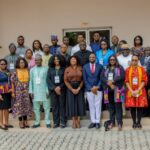INTRODUCING THE GLOBAL IT DAY: A CALL TO ACTION
International Information Technology Day, observed annually on September 24, was established in the early 2000s by global tech advocates and educational institutions to celebrate the transformative power of digital technology. Over the years, it has evolved into a platform for raising awareness about the critical role of IT in driving innovation, improving governance, transforming education, and promoting sustainable development across the globe.
Every September, the world pauses to celebrate International Information Technology Day a day that highlights the indispensable role of technology in shaping the future of our planet. The theme for 2025, “Leveraging Information Technology for a Sustainable Future,” is not just timely, it’s a clarion call for nations like Nigeria to prioritize digital transformation as a pillar of sustainable development.
The world is rapidly shifting, driven by innovation and digital ecosystems. For developing countries, especially Nigeria, embracing Information Technology is no longer optional it is imperative. If we must prepare our young generation for global relevance and secure a sustainable future, we must act decisively.
NIGERIA’S ICT CURRICULUM: A PROMISING START
Nigeria has made commendable efforts to integrate Information and Communication Technology (ICT) into its education system. The National Policy on Education underscores ICT as a core instrument for achieving educational goals. From the primary level through to tertiary education, the Nigerian curriculum now includes ICT as a standalone subject and as a tool for learning across disciplines.
Key highlights of Nigeria’s ICT curriculum include:
Early introduction to basic computer literacy.
Application of ICT in problem-solving and research.
Hands-on training in digital communication, coding, and data management.
Encouragement of innovation and creativity through technology.
This framework is not just about learning how to use a computer. It’s about equipping Nigerian students with the tools to compete globally, create solutions locally, and lead nationally in the digital era.
MEASURING IMPACT: BETWEEN POLICY AND REALITY
While the policy direction is laudable, we must confront the uncomfortable truth the implementation of Nigeria’s ICT curriculum remains uneven and deeply flawed.
Here are the major challenges:
1. Infrastructure Gaps: Thousands of public schools lack access to electricity, computers, internet connectivity, and safe learning environments.
2. Teacher Shortages: There is a critical deficit of qualified ICT educators, particularly in rural and underserved regions.
3. Outdated Content: Curriculum reviews are often slow, leaving students to learn obsolete technologies.
4. Digital Divide: Stark inequalities persist between urban and rural schools, Private and Public Schools, widening the digital gap among Nigerian children.
This disconnect between policy intent and practical outcomes threatens to derail the nation’s digital aspirations. It must not be ignored. It is deeply disheartening that despite the mandates and resources allocated to MDAs (Ministries, Departments, and Agencies) tasked with ICT development at both federal and state levels, the results remain discouraging. Even more troubling is the misplaced focus of many politicians, who continue to implement superficial ‘empowerment’ programs distributing wheelbarrows, and chemical ingredients for producing substandard creams, soaps, and detergents to young Nigerians. These are youths who clearly possess the talent to thrive in ICT-related initiatives if only given the right support and opportunities. The failure to harness this potential is not just wasteful, it is unjust.
IT FOR SUSTAINABLE DEVELOPMENT: THE NIGERIAN REALITY
The 2025 theme “Leveraging Information Technology for a Sustainable Future” resonates deeply with Nigeria’s development needs. In the hands of our youth, digital tools can:
Boost agricultural productivity through smart farming.
Expand healthcare access with telemedicine and health apps.
Improve governance via open data and e-governance platforms.
Drive youth employment through digital entrepreneurship, fintech, and the gig economy.
Nigeria has the population. Nigeria has the talent. What remains is the political will and investment to turn potential into progress.
RECOMMENDATIONS: TIME TO CLOSE THE GAP
To build a digitally inclusive and sustainable Nigeria, we must urgently:
i. Invest in Infrastructure: Equip every school urban or rural with electricity, internet, and modern ICT tools.
ii. Train and Retrain Teachers: ICT educators must be equipped with current skills and supported with ongoing professional development.
iii. Modernize the Curriculum: Regularly review and upgrade the ICT curriculum to align with global trends, especially in areas like Artificial Intelligence, cybersecurity, and cloud computing.
iv. Strengthen Public-Private Partnerships: Collaborate with tech companies and civil society to expand access to digital tools and training.
v. Ensure Equity and Inclusion: Prioritize access for girls, students with disabilities, and those in marginalised communities.
CONCLUSION: DIGITAL LITERACY IS A RIGHT, NOT A PRIVILEGE
As Nigeria joins the rest of the world in celebrating International Information Technology Day, let this not be just another ceremonial moment. Let it ignite a national conversation and drive real commitment from policymakers, educators, private sector leaders, and communities.
Our students deserve more than broken chalkboards and political handouts. They deserve access to 21st-century tools that can empower them to innovate, solve problems, and build a better Nigeria.
Digital literacy is no longer a luxury, it is a right. And the time to act is now.
Happy International Information Technology Day, Nigeria. Let’s transform intent into impact for every child, in every corner of our country.
Sarki is a Good Governance Advocate and Public Policy Analyst. He is the Executive Director Responsive Citizens Initiative
responsivecitizensinitiative@gmail.com














Leave a comment